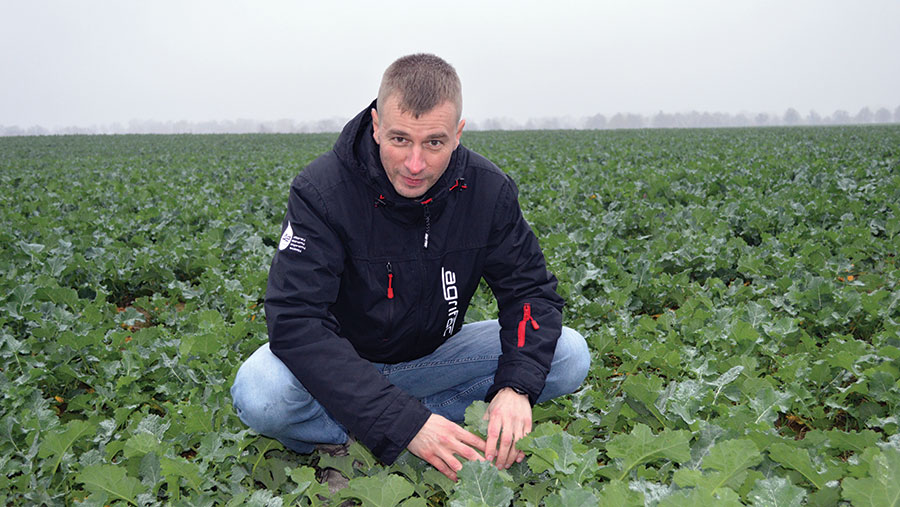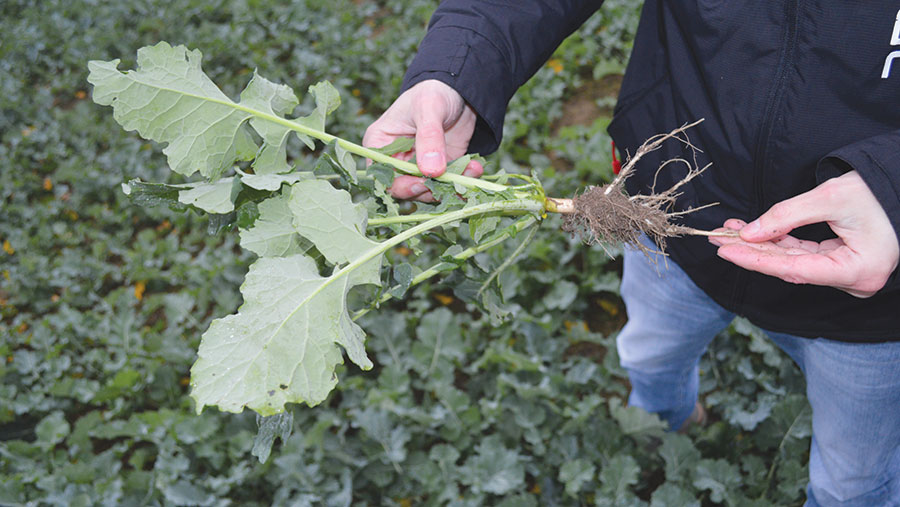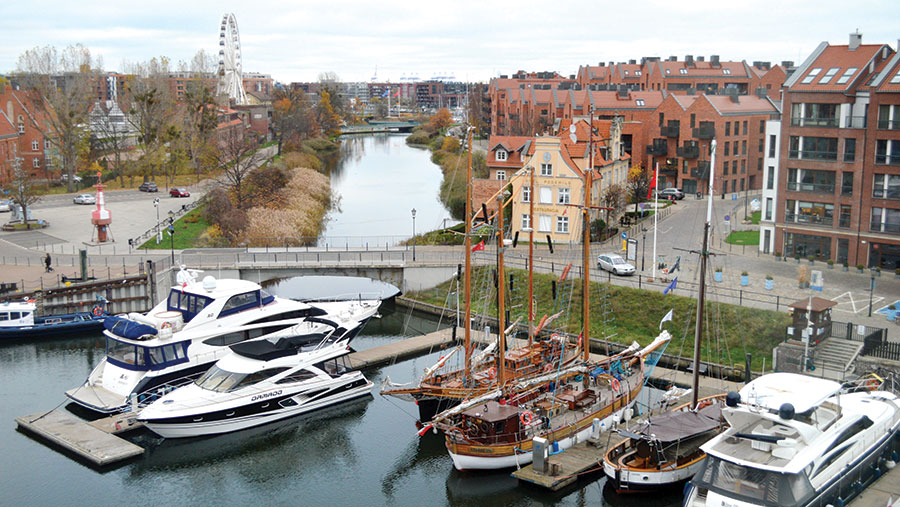Why a Polish grower turned to biologicals to cut input costs
 Jacek Dzieciniak © MAG/David Jones
Jacek Dzieciniak © MAG/David Jones Polish grower Jacek Dzieciniak is increasingly turning to biological solutions rather than the chemical can to push up his yields of winter wheat and oilseed rape while saving on expensive nitrogen fertiliser.
Biological products sprayed on his land have increased some of his rapeseed yields to more than 5t/ha and wheat to 11t/ha, at the same time allowing him to cut back on bagged nitrogen by some 30kg/ha.
See also: Rhizobacteria helps cut fertiliser costs on Cambs cereal farm
He believes the biologicals are helping encourage autumn rooting and alleviating plant stress, making his crops more resilient when sweltering summer temperatures in Poland soar to produce blistering heatwaves.
“I can see that these biologicals help improve the rooting systems, increase yields and keep costs down. We are continuing with this approach this season,” he tells Farmers Weekly from his farm in northern Poland, just inland from the Baltic Sea.
Reducing inputs
Mr Dzieciniak manages 5,400ha of medium to heavy arable land at Polhaz, in the region of Pomerania, 30 miles south of the main port city of Gdansk.
He is looking to cut back on inputs to save money and to fit in with the EU’s planned Green Deal.
Using the biologicals, milling winter wheat crops managed 9.4t/ha across 2,200ha in 2022 and oilseed rape averaged 4.4t/ha over the 1,100ha of rapeseed grown on the farm estate, which used to be state run during the communist era.
He is particularly keen to use these root-enhancing products to alleviate plant stress, as 2021’s very high summer temperatures reached more than 40C in June at the milky-ripe grain stage in wheat which, together with a lack of rain, saw hoped-for yields of 9t/ha-plus tumble to 7.6t/ha.
“Using the biologicals may have helped destress the crop in the summer of 2021,” he says of his decision to try the products out in the autumn of 2021.
Colonies of bacteria
He then tried a mix of two biologicals, AzotoPower and RevitalPro, which create colonies of several types of bacteria that help stimulate the crops to produce deeper roots for both winter wheat and oilseed rape and also improve soil structure.
These were sprayed on land destined for winter wheat and rapeseed one week before drilling, and were then worked into the soil in the minimum tillage cultivation system favoured across the extensive farming estate.
The first of these products, AzotoPower, had its first full season of use for harvest 2022.
It contains four types of bacteria that help fix nitrogen from the atmosphere and then make this valuable nutrient available to the plants.
It can be sprayed before or just after autumn drilling and also in the spring. On its own, it does not need to be incorporated into the soil.
Its popularity has increased due to its ability to reduce bagged nitrogen use in an era of high fertiliser prices, as well as fitting in with the EU Green Deal’s aim to make the 27-nation bloc climate-neutral by 2050.
When used at the autumn drilling timing or in the spring it can be mixed with other pesticides, such as pre-emergence herbicides in the autumn and fungicides, herbicides or insecticides in the spring.
Soil improver
The second product, RevitalPro, has been marketed for more than a decade and contains 13 types of bacteria that stimulate the mineralisation of plant residues in the soil to help its structure and improve the water-air balance.
This spray should be applied before drilling and incorporated into the soil.
These biologicals are manufactured and marketed by Polish biotechnology company Bio-Lider, and are exclusively distributed in the country by Anglo-Polish agronomy group ProCam.
On the farm, winter wheat varieties such as Findus from Syngenta, French-bred Chevignon and German-bred Argument are drilled from mid-September and into November.
The 9.4t/ha average yield recorded in 2022 was achieved using only 190kg/ha of nitrogen, which compared favourably with another good season in 2020, when wheat yields were 9.2t/ha, but using 220-240kg/ha N.
In addition, 30% of the 2,200ha of wheat grown on the farm for harvest 2022 yielded in the 10-11t/ha range, getting close to the Polish national winter wheat yield record of 12.56t/ha.
Similarly, in oilseed rape, the 4.4t/ha average yield in 2022 was achieved using only 190kg/ha of nitrogen rather than the 220-240kg/ha used in 2021, when average yields were 3.7t/ha.
Varieties grown on the farm include Absolut from Limagrain and DSV’s Batis. Average Polish oilseed rape yields in 2022 were 3.3-3.4t/ha.

©MAG/David Jones
“We see biologicals as the way to go. The soil looks good, we are using fewer chemicals and fewer inputs, and we are introducing colonies of bacteria,” he adds.
Poland vs UK – cropping areas
- Winter wheat area is about 2.3m hectares, compared with the UK at just over 1.8m hectares.
- Oilseed rape area is 1m hectares, three times the UK area of a little over 300,000ha.
Input costs
Dariusz Wyczling, head of agriculture at ProCam in Poland, says the cost of the biologicals is only 30-40% of the cost of the extra 30-50kg/ha of nitrogen that used to be needed on the estate before the new system was introduced, so their application makes sense financially.
Michal Ciszak, managing director of the company, says the sharp rise in nitrogen fertiliser prices – although not welcomed by growers – created a bigger need for innovation, such as these nitrogen-saving biologicals.
Another biological used on the farm is DeliaStop, which is used to deter cabbage root fly, the main pest problem for oilseed rape crops in Poland.
This product can be sprayed on the crop up to the two- to three-leaf stage and is claimed to make the roots less attractive to the larvae of the root fly.
This pest has been a big problem since the EU banned neonicotinoid seed dressings for use on oilseed rape crops in 2013.
Mr Dzieciniak says the biological product is not a 100% solution to the problem, but it certainly has had a positive effect on controlling the pest on the farm.
ProCam in Poland
UK-based agronomy group ProCam expanded into Poland in 2004 by buying a small crop protection group, called Botus, just as the eastern European nation joined the EU, and then the company expanded rapidly.
ProCam Europe was formed in 2008, and the UK and Polish group now claims to be Europe’s largest privately owned agronomy company, targeting a market of some 300,000 medium to large farms among Poland’s 1.7 million farmers.
The group employs 120 agronomists across the country and is ranked number two nationally in crop protection distribution after the Polish group Chemizol.
However, it is number one in the rapidly growing new product arena, including biologicals and foliar fertilisers. It also distributes some seed and bulk fertilisers.
The company is based in the Baltic port city of Gdansk, famous for being the birthplace of Solidarity, the trade union formed in 1980 whose strike actions through the next decade eventually led to political elections in 1989 and the fall of communism.
It is also where the first shots of World War Two were fired on 1 September 1939 when the German battleship Schleswig-Holstein shelled the Polish naval post at Westerplatte.

© MAG/David Jones

